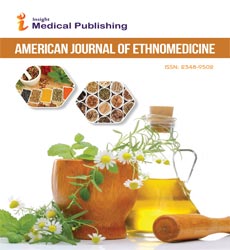ISSN : 2348-9502
American Journal of Ethnomedicine
Emerging Trendson Ethno Medicine
Hironori Maruyama*
Department of Life Sciences, the University of Tokyo, Tokyo, Japan
- *Corresponding Author:
- Hironori Maruyama
Department of Life Sciences, The University of Tokyo, Tokyo, Japan
Tel: 823659874125;
E-mail: maruyamahironori@lim.ac.jp
Received Date: December 01, 2021; Accepted Date: December 14, 2021; Published Date: December 21,2021
Citation: Maruyama H (2021) Emerging Trendson Ethno Medicine J Ethnomed Vol: 8 No: 10.
Description
In the study of ethnology, ethno biology is the study of the biological sciences practised by diverse ethnic groups. As a result, it includes current and historical knowledge of botany and zoology among diverse ethnic groups in Africa, America, Asia, and Australia, as well as the biology manifested in modern Western society. In 1935, the word "ethnobiology" was coined in the United States (by Custer). The name is made out of the words "ethnology" and "biology," and its style is similar to that of many other terms that have appeared since the late 18th century, when the words "ethnography" and "ethnology" first debuted. The concepts that developed these other ethnological areas are followed in the above definition of ethnobiology. Ethnic biology for instance, cannot be comprehended if ethnic linguistics and ethnic history were defined as the study of distinct ethnic groups' languages in their cultural contexts, as well as the study of their history. Unlike the primary affected people's perspectives. Because it will contain paleobotany, plant and animal pharmacology, zoo archaeology, research and domestication of valuable plants weight, this will not be a comprehensive study of all the links between humans, plants, and animals.
Building an unifying methodology and theoretical underpinning for such a subject will take time. The application of a precise ethnobiological definition offers operational and theoretical benefits, and the scope of this definition is narrower than that which is currently used in some professional circles. First and foremost, this concept establishes a clear link between the field and the social sciences, distinguishing it from botany and zoology's practical uses. It's also known as economic botany, applied botany, or zoo engineering.
It is a logical extension of most other "ethnic" disciplines, and it promotes a better understanding of ethnic biology's historical development by emphasizing the scientific knowledge of the surrounding biological elements that different ethnic groups have discovered, which a key aspect of the general discipline is. In the last century, the interaction between humans and their environment has been felt. Science has traditionally been regarded as a product of Western civilization. The idea that people of different races can participate in scientific research is relatively recent. This is a power issue, as evidenced by the quantity and degradation of terminology used to distinguish by Western scientific authority.
What is the source of "scientific" knowledge? Non-Western peoples' science for example, is referred to as "folklore": "natural knowledge," "foresight," or "super science," if it is not "natural history:" "knowledge" is basic and straightforward, "traditional ecological knowledge," or simply Worldview. In many circles, a similar problem exists, namely, the possibility that communities outside of the great civilization may have complicated linguistic systems. To remind our religious history, when Christianity was the centre of power and all other religions were categorised as paganism, idolatry, or superstition, tribes or indigenous peasant groups' languages are often referred to as "dialects." The ruling society claims to enjoy the privilege of science now that authority has switched from religion to science. Ethnobiology's history covers more than a century (from 1860 to the present) and has seen some shifts in attitudes concerning non-Western people's knowledge levels. This is obvious in the writings of numerous authors from North America, Europe, and other parts of the world who have a common interest in studying the knowledge of many ethnic groups' plants and animals. Initially, these authors, doctors, archaeologists, botanists, and ethnologists were mainly interested in how ancient peoples used biological materials in the environment for economic purposes. They then moved on to rural nomenclature and systematic classification, and lastly to resource knowledge and management.
Open Access Journals
- Aquaculture & Veterinary Science
- Chemistry & Chemical Sciences
- Clinical Sciences
- Engineering
- General Science
- Genetics & Molecular Biology
- Health Care & Nursing
- Immunology & Microbiology
- Materials Science
- Mathematics & Physics
- Medical Sciences
- Neurology & Psychiatry
- Oncology & Cancer Science
- Pharmaceutical Sciences
